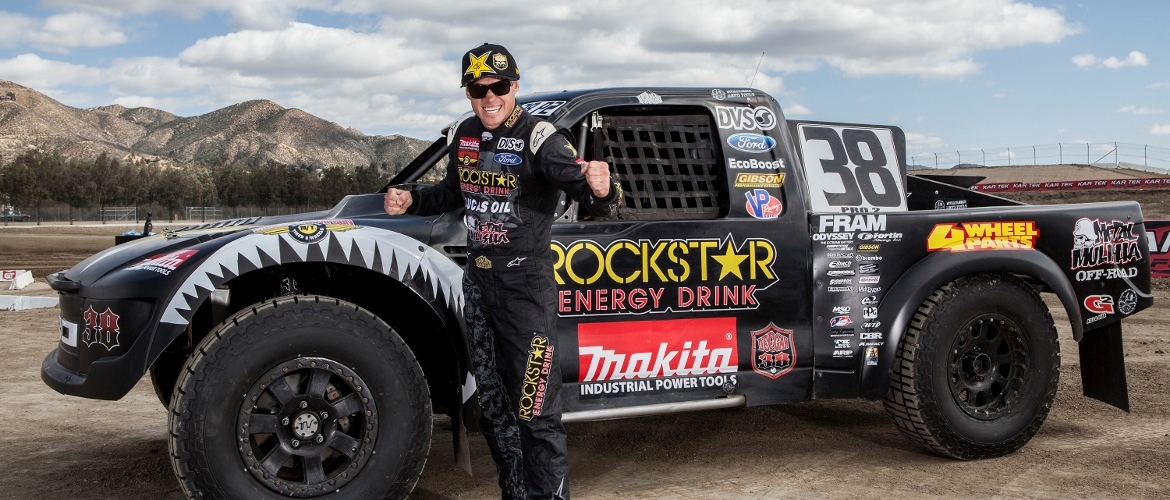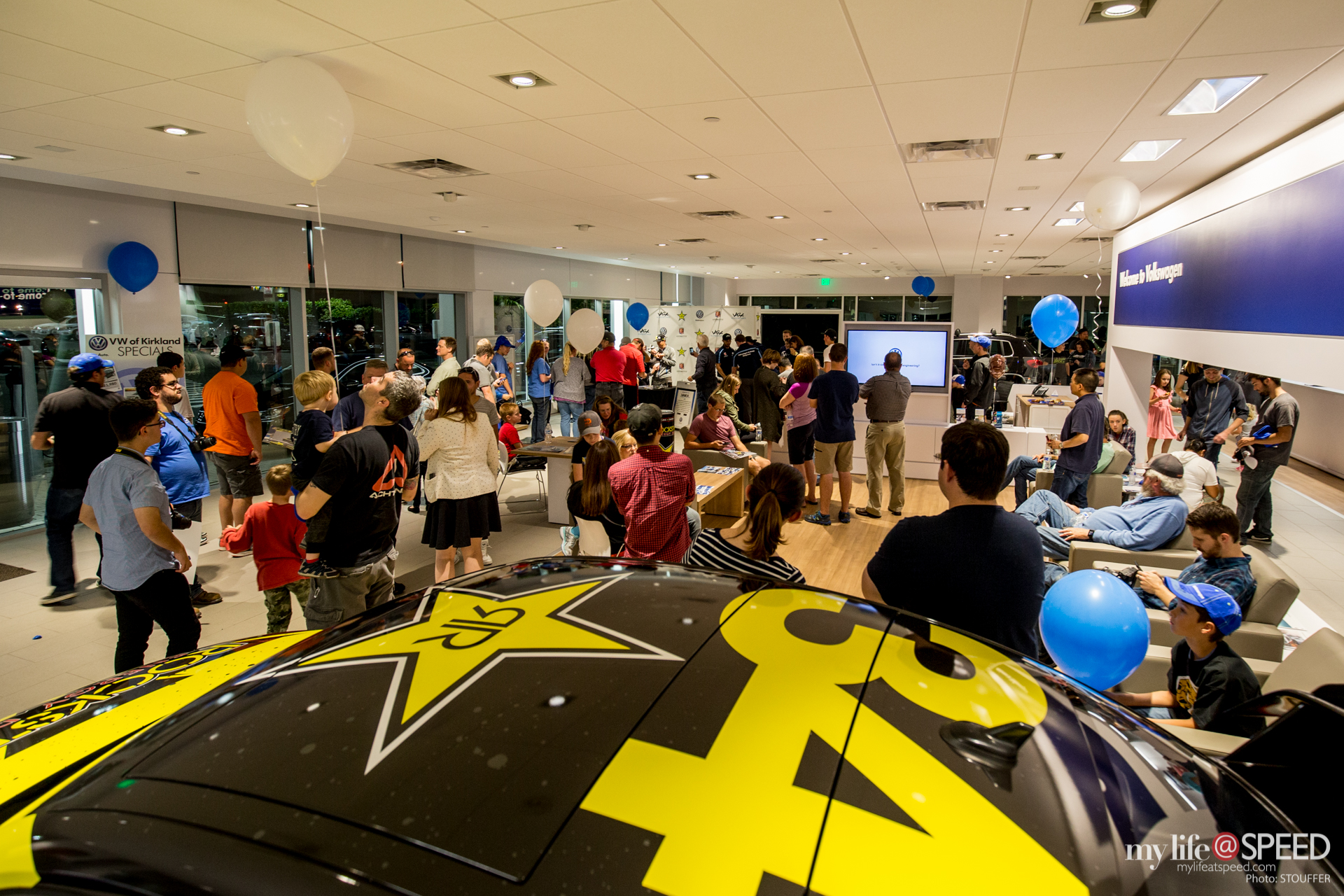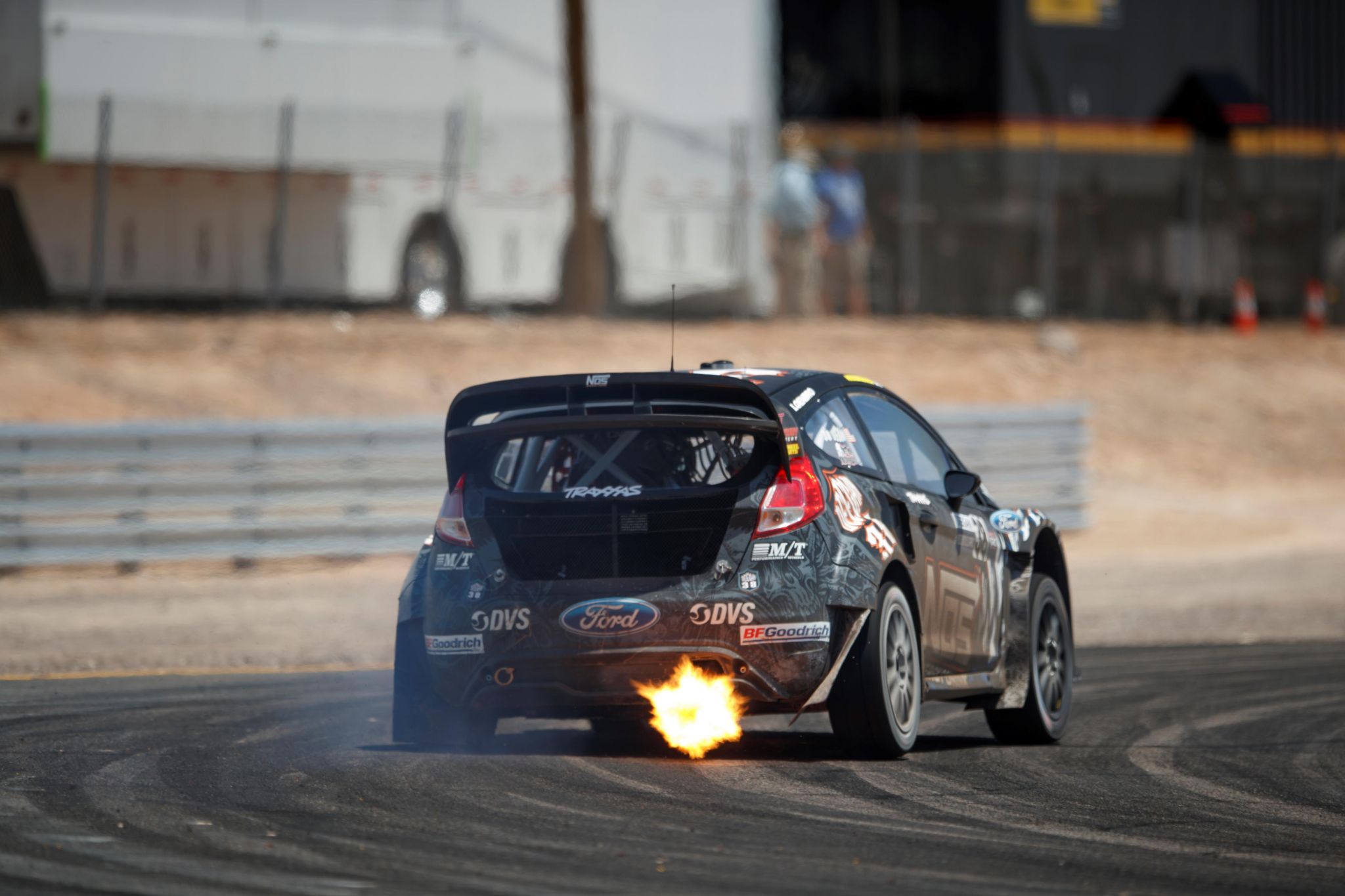With a professional career spanning two decades, Brian Deegan, has built a reputation for toughness, tenacity and hard-fought success. He left his life in Omaha, Nebraska behind to make it on his own in California back in the early 1990’s. With nothing more than fire in his belly and a deep well of talent, Deegan himself had no idea of what the future would hold. He’s gone on to pioneer the sport known as Freestyle Motocross and dominate that competition in X Games. Besides his athletic achievements, Deegan has also proven himself in the business world by building Metal Mulisha into a highly successful brand. In 2009 he embarked on a four-wheel racing career with the Lucas Oil Off-Road Racing Series winning the Unlimited Lites championship. In 2010 and 2011 he was named Lucas Oil Driver of the Year.
Deegan also tried his hand a rally driving during X Games 15, tying for bronze with Tanner Foust. He won silver the next year but finally took home gold for rallycross in 2011. At X Games 18, he went toe-to-toe with one of the world’s best rally drivers, Sébastien Loeb and took home a bronze medal for his efforts. This made the world’s motorsports community sit up and take notice of this titan from Temecula. Greg Tracy and I were thrilled with the opportunity to chat with this business man, family man, Octane Academy mentor and one of the toughest guys on two wheels or four.
MLAS (MH): How did motorcycle riding become part of your life when you were a kid?
BD: It’s really kind of crazy because I grew up in a small town in Nebraska and motocross wasn’t big. I played soccer when I was a kid. I was really into soccer but when I was about eight years old, my neighbor moved in from Europe, and he raced motocross. He was a little older than me and so I always hung out at his house and [was] interested in it. He took me to the track with him and then I saw a whole new world really; and just begged my Dad for a dirt bike, who never had ridden a dirt bike in his life. Finally he got me one and I just built a little circle-track in my backyard, and just rode my dirt bike every day. I was so motivated to win that I just focused all on that and slowly started moving forward and started hitting the Amateur Nationals and started winning races. That was the whole new thing for me.
MLAS (MH): When you left home to make it on your own in California, was it because you knew it was possible to make a good living as a pro rider or because you couldn’t be happy doing anything else?
BD: You know at that point, I had already travelled all over the United States while I was in high school and junior high to race Amateur Nationals, and I raced for Team Green Kawasaki. I got to see all over and I noticed that all the fastest kids came from California and that’s where the whole industry was. So I knew I had to go there to make it. I spent the majority of my life trying to become a professional motocross racer and you know, get a factory ride and make money doing that. That was my dream and goal, so I knew I had to go to California. So I graduated high school and told my Dad to give me one year to try to get on a race team. I packed up my bikes and my old truck and I drove to California when I graduated high school. You know, rented a room, slept on a buddy’s floor – just made it happen. I was just so motivated not to have to go home. I didn’t want to go back to Nebraska and I just wanted to make it work out, out in California. That was really my motivation and this is where everything’s at and all the steps, took a lot of chances and it kind of panned out.
MLAS (MH): You rented a room?
BD: Yeah in California [with] my old pickup truck, I had some friends I had met at the Amateur Nationals. I just like rented a room from a friend for a couple hundred bucks a month and just stayed with him, and barely made enough money to get by. But then I ended up winning a supercross and getting on a race team and then it just started rolling from there.
MLAS (GT): Do you feel that your motocross background has given you an advantage in your four-wheel races?
BD: Yeah, I feel like motocross has been the best foundation for motorsports for me and you know, coming from motocross you learn how to read the track. You learn about all aspects of racing and I feel like that’s what really helped me going to four wheels and right from the start, start winning. I think it’s a great foundation. If you look at Jimmie Johnson or there’s multiple guys that come from motocross that have gone (on to) four-wheel sports and have won. So I think that’s a big advantage for me.
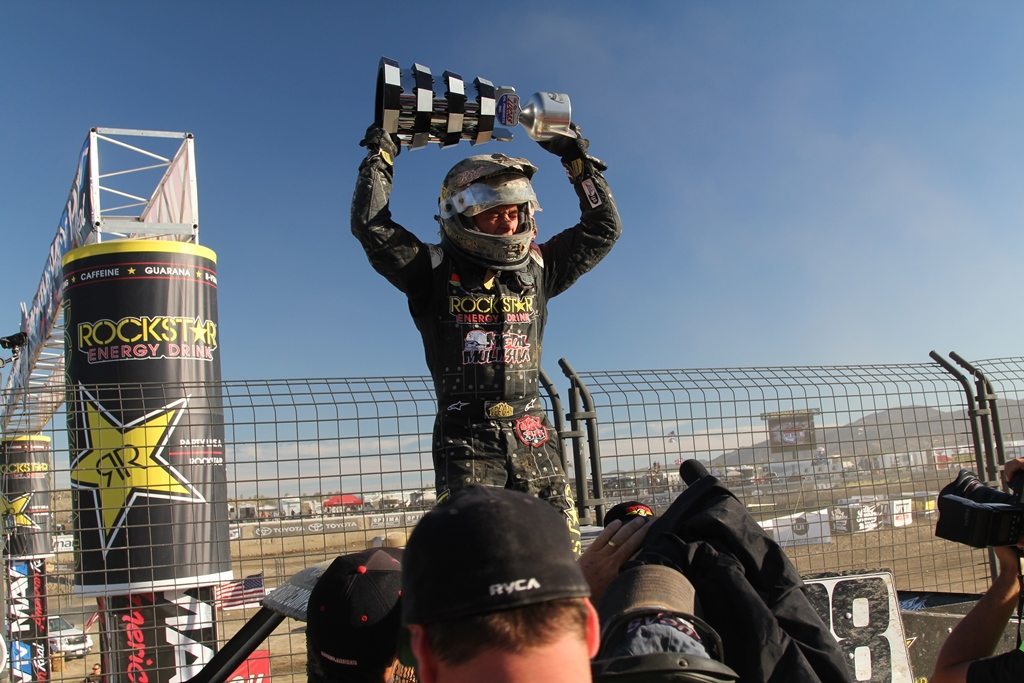
MLAS (GT): Do you believe the increase in injuries in motocross can be attributed to the switch from two-stroke to four-stroke bikes?
BG: Yeah, I feel like the bikes have been so much faster now. They’re quite a bit faster and the more speed, the bigger jumps and then come the bigger crashes, and has definitely affected the safety of the sport.
MLAS (MH): My first introduction to you came through covering the GRC and I was so impressed with your level of determination. I mean, they should never count you out in a race because you will be charging up to the front. It’s only a matter of time.
BD: (chuckling) Yeah it’s kinda crazy to think like I didn’t grow up racing cars. The first time I got into four wheels was like ’09. I started racing off-road trucks and didn’t get into rally cars until 2010. I got a race in X Games. I got to do one test and then I got to go race X Games. I just missed winning a medal my first year and I think the next year I came back and got two silvers, with like a couple days of testing. Then the next year I came back and won. It’s kind of weird, you know? Like, I haven’t had a lot of time in a rally car. My main focus has been off-road trucks ‘cause that’s kind of where I make my living. That’s where I make decent money racing trucks and that’s where my sponsorships have really gone to. So believe it or not, rally has been my second sport on four wheels but I’m still yet to put full 100% focus on it.
MLAS (MH): Are you interested in trying a race like Baja or the Mint 400 that are really, really off-road?
BD: Yeah, I would like to. You know I’ve never been a big fan of going down to Mexico but I would like to. I know to have really tried everything, I will one day. You know, I will race one of those races or some of those races at some point, but what I always say is I’ll do it when I have the right opportunity. I’ve raced a couple desert races before in like a buggy class 1 car which is not as good as a trophy truck. My first experience I raced in a Class 9 car out in the desert when I was trying to learn how to drive back in like ’09 or 2010. I made it like two miles. It was like driving a VW, you know a Volkswagen Bug, in the desert. It was horrible (laughing) and I went out and made it like two miles out in the desert and the car broke. It didn’t have a radio and I sat out there for like a whole day, and I was like this sucks. I’m not doing this anymore so that was my bad experience in desert. So I kind of just said if I ever get a good chance to race a trophy truck on a winning team? Yeah for sure, I would love to do it.
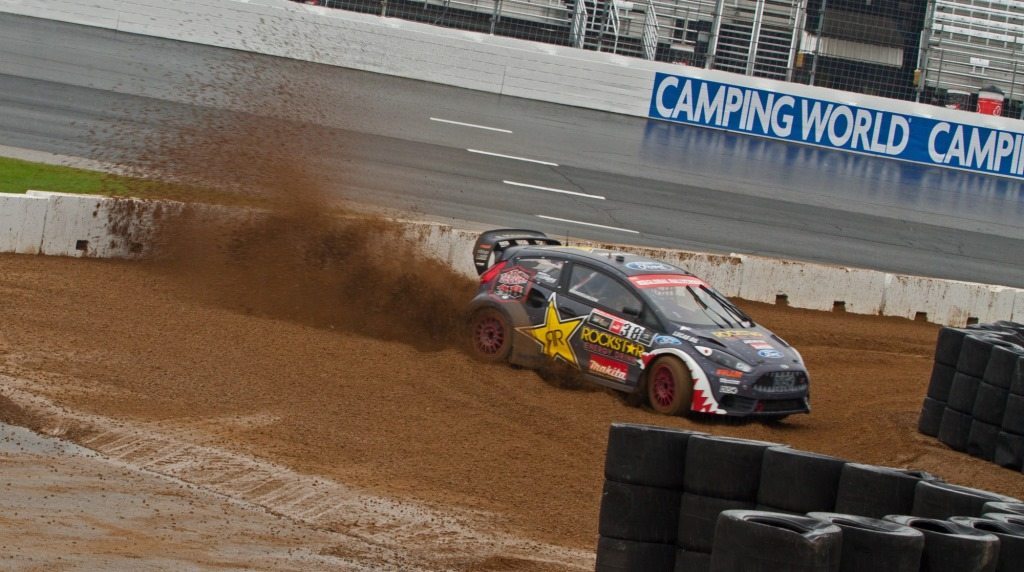
MLAS (MH): Metal Mulisha started out as a freestyle team but it feels like the sky’s the limit. The clothing line is very diverse. How much work goes into it?
BD: I went down and filed the LLC. I built the business. I used to work at the office and like shipping clothes and building all the products. First we started doing t-shirts and hats ‘cause that’s just what the kids wanted once they saw us wearing them at X Games. For eight, nine years I ran the company. Once we got into the big money and started selling, that time, I just couldn’t handle it anymore. It was just too much. I needed help because it was growing too fast and so that’s when I went and found a partner to license it. Basically I licensed it to a company called La Jolla and they manufacture clothing on a major level. They do O’Neill Surf and like a bunch of big brands. So they took the brand and I just gave them the rights to the soft goods and they just launched it and took it to the next level, and all of a sudden the thing grew so fast.
It’s cool, you know? Just sit back and I’m still involved in all the day-to-day as much as I want to be; but my main focus is just being an athlete and racing and still, a lot of people think over the years – ‘cause Mulisha started as just me and a couple guys, like a group of friends just riding dirt bikes. That’s what X Games was. Like we went to X Games, we helped invent the sport of Freestyle Motocross and that was just the name of our crew. Still to this day, I think a lot of people think Metal Mulisha is a clothing company, and I’m really kind of on a mission right now to kind of bring it back [so] people know – Metal Mulisha is us. It’s a group of guys and it’s a group of friends that ride dirt bikes. It’s not a clothing company. It’s not shoes. It’s not this or that, but that’s the difference, you know?
MLAS (MH): Looking at the Team page on your website, there are MMA fighters and musicians there now. Are they part of an expansion initiative or are they part of the core Metal Mulisha?
BD: It’s part of the expansion. I always wanted to do what we’re into, you know? I just want to support the things we’re into. I was always into rock music, always into MMA. There were certain other sports that we just like so that’s kind of how it grew into all those other properties. That’s just us supporting the sports that we really like, and it’s marketing. It’s just business. It’s kind of what we have to do to stay relevant, competing with other brands out there.

MLAS (GT): What are the key attributes to being both a successful businessman and athlete?
BD: First I was an athlete and that was my main focus, being the best I could be, racing motocross as a kid growing up, trying to be the best. Then you know my Dad raised me, he was a business guy and I got raised around that world and I just knew the importance of that. It really came from sponsorships, when companies started paying me to run their product logos and promote/endorse. The products I saw, I’m like, well why am I always promoting everyone else’s product? I should really be trying to build my own products also, so that’s really what motivated me. So I started the business or multiple businesses, and just started promoting them through my connections and my sport. So that’s really how the business got growing.
MLAS (MH): In your career, you suffered a couple truly terrible motorcycle accidents. Was it hard to shift your focus from taking those kinds of risks to exploring different types of racing?
BD: I had a bad, bad crash and I broke my femur in like five spots, my hip, my wrists, and I came back from that injury a year later to win in X Games. That’s like the point where I started going, “Man, this sport’s crazy.” You know, it’s dangerous and I’ve had buddies die from the sport. After having my daughter, those things started playing into the deal, playing into your thinking. The final straw was in May ’05, was shooting Viva La Bam for MTV and I did a backflip. It was real windy, and I ended up crashing. The handlebar went into my stomach and I blew out my kidney and my spleen. I was bleeding to death and basically the doctor – (I) went to the hospital and they didn’t think I wasn’t going to live. So the doctors said they don’t know how I did. They said my artery was cut and somehow stuff was lodged in my artery that which kind of helped me not bleed to death.
So there was like the doctors leaning over me in the surgery room going, “All right, is there like anything you want to tell your family?” I was just, man this is crazy. I was praying going, “Please God let me live through this.” And I woke up you know with tubes everywhere. At that point I’m like, man, I know I’m not a dumb person. You know, I grew up and I was good in school. My Dad has a doctorate degree in education and I’m like why am I stuck doing this thing? So that’s the point where I was like, I need to start looking at other things so I started talking to Rockstar Energy Drink. You know, it took a while. It took a few years of back and forth, and they finally offered me a spot on one of their truck racing teams. And that’s when I said, all right I’m going to show these guys that I can do it and that’s kind of how it came about; and was able to get off [from] competition on dirt bikes and get into racing, back to racing. Back to racing again which is what I always wanted to do, I always missed racing when I left motocross to do freestyle so it was good.
MLAS (MH): Considering what you’ve been through, what you’ve suffered. Your kids are all into the sport now, do you ever feel tempted to steer them towards different interests?
BD: Yeah, I tried. At the truck races and off-road races there’s a kids class and I feel like kart racing or four-wheel racing is relatively safe. And so my daughter started racing kart and she ended up becoming national champion in the kart series. My son, I put him in a go kart at like six but he didn’t like it, so he just wanted to race motocross. I avoided it for like two or three years and then finally I took him to the races ‘cause he kept asking and I hadn’t been to the motocross races for fifteen, twenty years. I went back and within six months, Haiden’s winning all the nationals. It’s crazy! He won like five titles his first year which is pretty big in motocross. All of a sudden factories are calling me so I ended up doing a deal with factory KTM with Haiden, like youngest kid that they’ve ever signed to like a factory contract, which is crazy! Yeah, it’s dangerous and — scary (nervous chuckle) but I don’t know. Hopefully Haiden learns the ways of racing, like he learns how to be a really good racer and then by twelve, thirteen before he gets a big bike, I can see if I can get him in a race car.
MLAS (MH): Not to pry but how do you balance your personal life with your professional one?
BD: I feel like my personal life has always been mixed with my racing, and with X Games, with everything I do. I’m always at the track. My personal life is always mixed with what I’m doing. I have a personal life at home for sure and I definitely try to keep what’s inside my house – separate. You know I’ve had offers to do TV shows and stuff like that on my family and I just avoid it. I think my kids going to school and what happens in my house is separate. Everything that happens outside my house is in the public eye. I’m used to it at the race track, so that is where most of our time is spent in our motorhome, at the race track and that’s just fine. But yeah my personal life is in my house and that’s always kept private. I just try to keep that to being normal. You look at like Hulk Hogan or like guys with these shows, and the wife or the kids are getting subjected to stuff that they’re probably not used to and it tears apart the family really. So I think right now, it’s better just to keep the private [private]. You’ve got to have separation, for sure.
MLAS (MH): What do you wish somebody would have told you after winning that famous race in 2007 at the LA Coliseum, but instead you learned the hard way?
BD: I don’t know. I think that you know, to win the supercross there was a lot of hard work. It’s hard to say because I feel like if I would have been a little more respectful or a little nicer in my days of racing, I probably would have got a lot further; but people did tell me that. (chuckles) I had to learn the hard way on everything, and because of that I had walked away from racing and started Freestyle Motocross, which launched me into the Metal Mulisha brand and making a living ten times of what I would have made if I had stayed in motocross. And it’s, I think just people already told me everything that they were going to tell me and I just wasn’t listening really (chuckling). The only thing I regret in my life is going — and doing that backflip on that day where it was too windy to ride, and the production company was like, “Hey!” They were pushing me into it. I let the pressure get to me and I did and I almost died. That’s probably the only day I regret because now I have to live with one kidney and you know, it’s different so it’s changed my life a little and that’s probably the only regret I have. But I was never good at listening to what people told me.
MLAS (MH): Well after working so hard and beating the hell out of everybody, you’re the king at that point in time and not listening to anybody, so it’s understandable.
BD: (laughing) Yeah it was pretty funny that like right after that race, when I won the race I ghost rode my bike over the finish so they fined me for that, and then I went up to the podium and said, “I just kicked everyone’s ass!” and then they fined me for that! (laughing) So, it was just pretty funny and couldn’t have been planned any better.
MLAS (MH): Congrats on your candidate, Burton Jenner, winning Season 2 of Octane Academy. Your camps at the Metal Mulisha compound have been awesome. Besides the paintball gun obstacle courses and fire hoses, you make your guys have to prove their skills in different vehicles. That’s a real stand out on the show. How important is that kind of versatility in motorsports today?
BD: I think like I always say that it’s a new breed of athlete that can do multiple things, and I think that’s a newer thing in the last decade? You know, especially because of X Games having multiple sports. It’s pushed the athletes to try other things. There are so many other sports that I’ve tried because of X Games. For me to be able to ride dirt bikes, motocross, freestyle, rally car, truck racing, monster trucks – all this stuff I do. I look at guys like Travis Pastrana, who was really one of my motivations when I saw him race rally car at X Games. I’m like, dang if that dude can do it – then I can do it. It just really pushed me to do it. I think it’s just the new breed of athlete. They’re rare, you know? The sightings are kind of rare but those are the guys that have the value, you know.
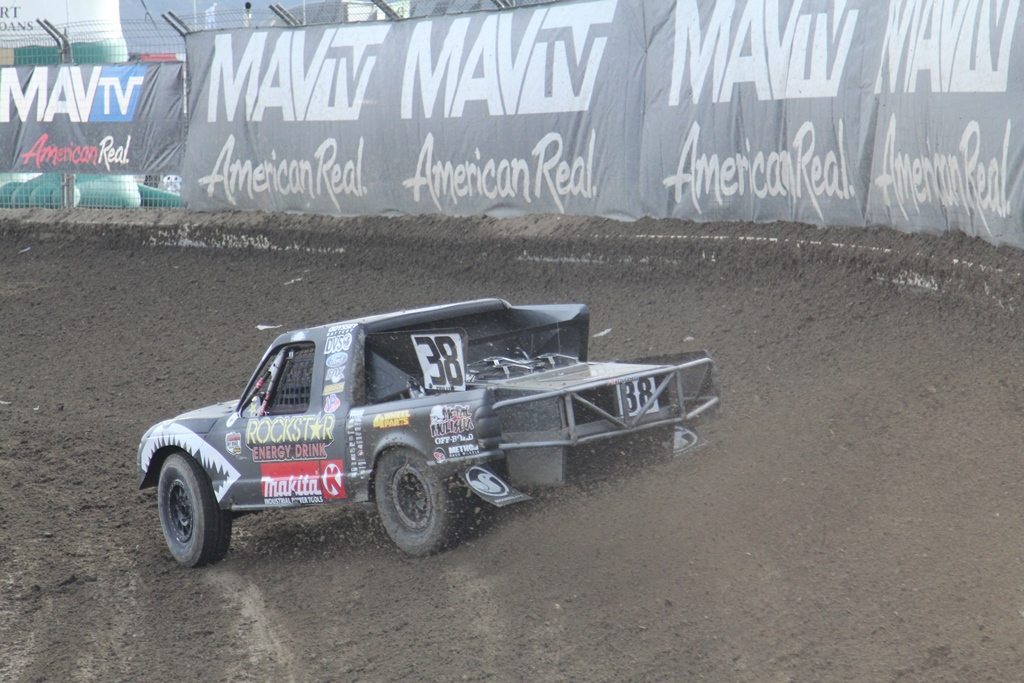
MLAS (MH): Before a race whether in cars or trucks, how do you prepare yourself?
BD: I just listen to music and kind of just mentally focus on what I’m going to do. I go to the starting line with a game plan and I plan on winning. That’s what’s in my head and then everything in between that and the checkered flag comes from my reactions of what I’ve been trained to do. For me I just mentally go through what I’m going to do so I prepare.
MLAS (GT): Tanner Foust has officially made the switch to Volkswagen. What kind of impact do you feel this will have on the Ford team in the 2014 GRC season?
BD: Well Tanner was a good teammate. He’s one of the best teammates I’ve had. He really helped me a lot when I got into rally racing, and he’s one of the few guys I’d say that really was like helping me. But you know I feel like we learned a lot and it got to the point where we were competing against each other and started battling for race wins. Then you know, the help got less and less, which is fine. You know, I feel like him going to VW is just going to make the Ford team try harder. It’s probably a good thing for the Ford team that they’re going to have to push not to get beat by the other team that’s going to be strong. You know I think it sucks that he’s not there for sure but that’s business and people have to make money, you know, to survive. So that’s kind of what it comes down to.
MLAS (MH): What are you looking forward to the most for this season?
BD: I just like the thrill of winning, thrill of racing. You know it’s hard to explain but it’s just the energy and rush you get from beating the rest of the competition and outsmarting them. You know, making your equipment better, it’s just a big chess match and I think it’s just the thrill of winning is what I look forward to. It’s kind of like when I did freestyle motocross, it was that one big trick or one big moment that’s such a rush. In racing you get that. In motocross and freestyle was more like, “Wow I survived that. That could have been a bad crash.” But truck races are more of just a sense of accomplishment.
A Final Word
Brian Deegan’s list of accomplishments is still growing. We’re looking forward to seeing what this talented multi-hyphenate will conquer in 2014. You can follow up on his latest activities by checking out his website but connecting with him via social media:
Facebook: http://www.facebook.com/mmdeegan
Instagram: http://instagram.com/briandeegan38
Twitter: http://www.twitter.com/mmgeneral
YouTube: http://www.youtube.com/user/mulishavideo

